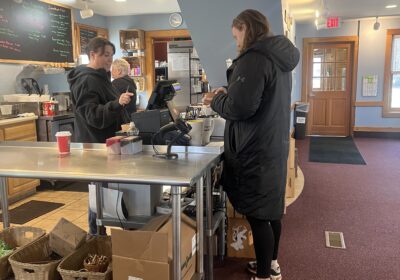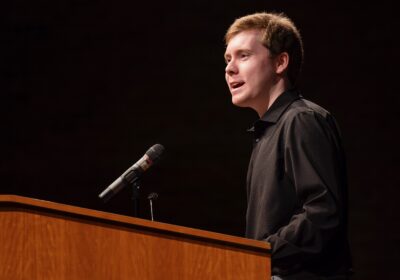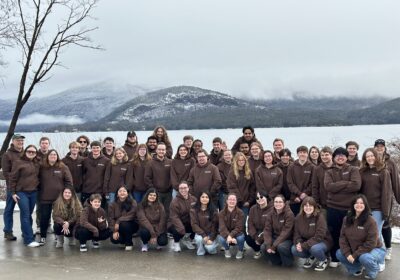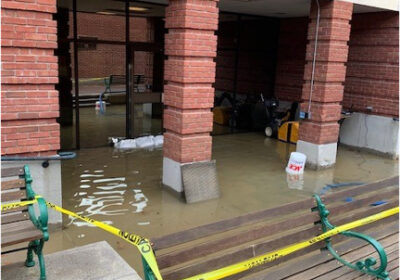Mentors have big impact at Castleton Elementary
Castleton University’s Mentoring Program has continued to team up with Castleton Elementary School to provide university students a chance to make a difference in their elementary school mentee’s life. The program also seeks to give the mentee the encouragement to “Plant the Seed for College.”
Each year, mentors are paired up with students at the local elementary school. Mentors get to spend an hour per week playing at recess and having lunch with their mentee while knowing this is having a huge impact on a child’s life and their education.
The program expanded this year to encompass the third grade class because the fourth grade class doubled in size. In past years, fourth and fifth graders had recess together from 12:30-1 p.m. and then lunch from 1-1:30 p.m.. With the fourth grade doubling in size, they needed a separate recess and lunchtime for fourth grade. Third grade was then put with fifth grade, which led to more mentoring opportunities.
Kate Spaulding from the Education Department and Ashley Haggerty from the Fine Arts Center are the Mentoring Program Coordinators. They provide support to the mentors and mentor leaders.
A few Castleton University students each year are selected to become mentor leaders who run the program, communicate with all the mentors and go to the school to mentor each week. This year, Sammy MacEachron, Morgan Demers, and Nick Aleksonis are the Castleton student leaders.
Spaulding stressed how the program is all about positively impacting a student’s life while also showing them that no matter what, a higher education is always a possibility.
“Our mission for the program is for getting youth to think about their futures early on in life and for them to know that higher education is a possibility for each and every one of them,” she said. “This is why we look for mentors each year. The mentors are the ones being the role model for students and providing them with the necessary tools and resources to think about their future in education.”
There is a misconception that the Castleton Mentoring Program is just for athletes and education majors, but anyone is able to participate and encouraged to do so. Freshmen are encouraged to sign up so they can be a part of the program while studying at the university, the hope is they will be able to continue in the program year after year while building really strong connections and bonds with the Castleton Elementary students.
Consistency and stability were stressed by Spaulding. When Castleton students become mentors, they are signing up for a yearlong commitment and committing to seeing their mentee at least one hour per week.
The elementary students get attached to their mentors, so the mentors need to make the commitment to be at the school and to spend time with their mentee.
The elementary students look forward to the Castleton University students coming each week. The principal of the Castleton Elementary School, Kathleen Kilbourne, really encourages the program and the community collaboration between the university and elementary school.
“We are so pleased to have the Castleton University Mentoring Program with our third, fourth, and fifth grade. Castleton University students visit weekly during lunch and recess. The success of this program is evident; attendance is up and behavior referrals go down on mentoring days,” Kilbourne said.
The Mentoring Program has really impacted the students at the elementary school because when they know their mentor is coming, student behavior and attendance is better because they want to spend time with their mentor.
While the number of elementary students increased this year and the program expanded to include the third grade, the number of university students as mentors has decreased especially between semesters.
The program is meant to continue for the entire school year. While students sometimes have conflicts and cannot continue to be a mentor into the second semester of the year, it is usually only around one or two students who drop out of the program.
Spaulding said she understands some students can’t fit mentoring into their schedule both semesters, but they prefer students communicate with the program leaders about conflicts so it can be communicated with their mentee why their mentor won’t be back.
This year, there were roughly seven mentors who did not come back the second semester and most were male. Two mentors transferred schools while five mentors never communicated why they weren’t returning for the spring semester.
Spaulding stressed that consistency from the mentors is important, because it really impacts the elementary students when it is not provided.
While there may be conflicts with Castleton University students’ schedules from semester to semester, Spaulding said the Mentoring Program is willing to work with university students. The coordinators of the program want to make sure they are accommodating to the students who are volunteering their time to help with the program.






